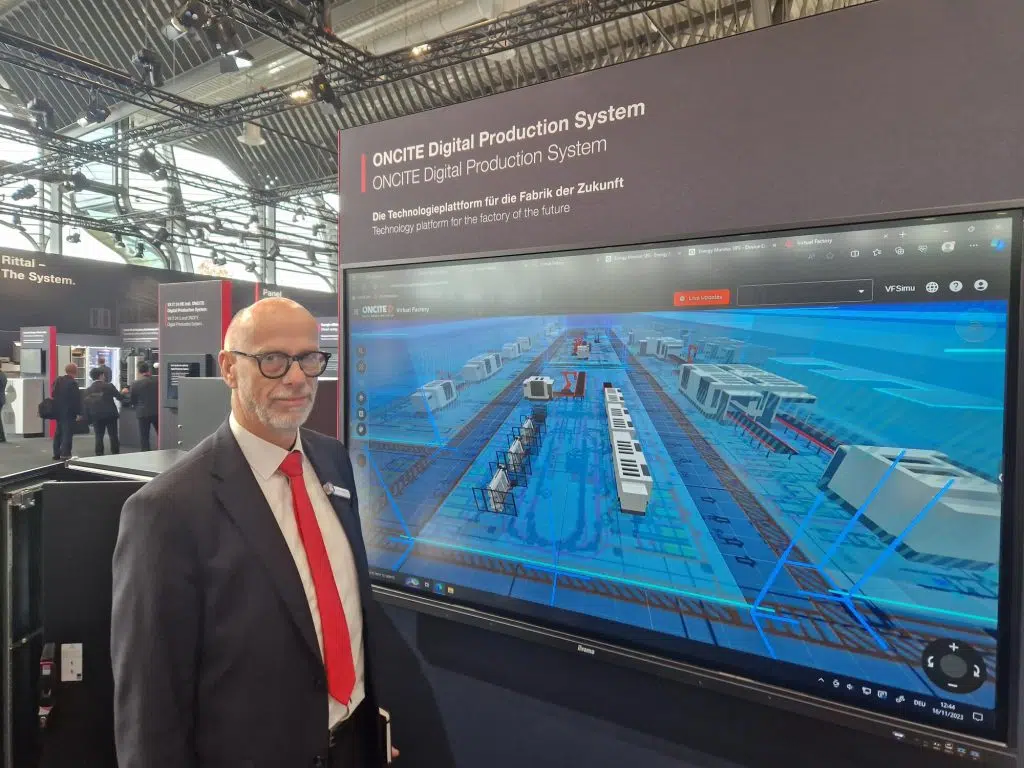SPS 2023 insights: digital technologies are flooding the industrial world
Two things were obvious at the SPS fair in Nuremberg: IT is the main value driver in the OT world today, and the SPS fair is as relevant as ever. Here are the key insights from our discussions with many industry experts:
Container-based industrial edge management solutions are becoming widely available: Leveraging container technology to manage applications at the industrial edge is becoming a mainstream topic. PAC has been watching and analyzing the vendor landscape for years; we consider SPS 2023 a milestone in the evolution of this market. On the one hand, leading vendors like Siemens (Industrial Edge Management), Phoenix Contact (PLCnext), and Bosch Rexroth (ctrlX) keep enhancing their offerings and partner ecosystems. On the other hand, more vendors from the industrial automation space, such as Hilscher, KEB, Lenze, Rockwell, and TTTech, are entering this market with their own solutions.
Vision systems are becoming more integrated with AI: Cameras are not a new topic in the factory, but combining them with more and more AI capabilities is now moving to the forefront. These systems combine cameras, IT infrastructures, and AI-based software to localize and recognize objects or people, check quality, and track motions. At SPS 2023, we saw what vendors like AWS, Eurotech, and Phoenix Contact can do in this space today; we also became aware of new partnerships like Siemens with Basler and MVTec, aimed at integrating the latter two's vision capabilities with Siemens' portfolio to jointly offer plug-and-play solutions.
Prototypes of GenAI-based industrial assistants are emerging: AWS showed a demo of a GenAI-based assistant that helps workers to quickly find relevant information about work procedures in a multitude of information assets and reference the source. The Italian start-up 40Factory presented its own virtual assistant – Wilson.ai – for the same use case, dedicated to manufacturing. Wilson.ai is based on Azure GPT; the system is currently undergoing a beta phase with 20 customers. The product launch is planned for early 2024. Siemens showcased its Industrial Copilot with similar capabilities, demonstrating how it helps Schaeffler’s automation engineers to generate PLC code much faster.
Start-ups are diving into industrial process mining: For years, PAC has been expecting companies like Celonis to apply process mining to industrial processes. However, this has so far not been their focus. At SPS 2023, PAC became aware of two interesting start-ups in this field - ONIQ and Xplain Data. ONIQ helps companies in the manufacturing industry build digital process twins to gain deep transparency into their production processes. This allows them to uncover hidden inefficiencies, do root-cause analysis, identify best practices, and continuously improve processes. The company says it is working with the first clients in the German metal industry. Xplain Data's Causal Discovery algorithms enable companies to identify relevant causal relationships behind many trivial correlations in their “real-world data”. Xplain Data supports customers in the mechanical engineering, manufacturing, and healthcare sectors with using the insights gained (cause-and-effect logic) for production and yield optimization as well as care management.
The industrial metaverse in search of use cases: The industrial metaverse was not a big topic at SPS 2023. We seized the opportunity and talked to several vendors who have been offering factory simulation software for years (for example, ISG, F.EE, Dassault). Their feedback was quite similar: they don´t see any obvious added value coming from the industrial metaverse. From their perspective, many capabilities (such as high-quality simulations and real-time collaboration) already exist today. While there is always room for further improvements, they often don´t see any demand from customers. However, German Edge Cloud showed an interesting demo related to the industrial metaverse: the combination of a touchscreen display and a factory digital twin. The solution allows to zoom in and out and provides real-time transparency on the shop floor in an easy way (see picture below).

The adoption of vPLCs and Kubernetes is still limited: PAC believes in the potential of container orchestration and virtualization technology for industrial purposes. That is why we talked to different vendors in this space (for example, Red Hat, Logiccloud, Siemens, and German Edge Cloud). What we heard confirmed our view on the status quo: the adoption of these solutions in the industrial space is limited to innovators, and progress remains slow. Nevertheless, we will keep an eye on any developments.
Microsoft has scaled down its ambitions in the manufacturing industry: It was interesting to see that Microsoft was not present at the SPS this year. This, combined with the significant headcount reductions around Azure IoT and the unchanged situation of Microsoft's Industry Cloud for Manufacturing (which has been in public preview for years), paints a clear picture: Microsoft currently has not intention of extending its manufacturing-specific capabilities and go-to-market.
The SPS is on a good way back to pre-COVID levels: Last year, the first SPS after COVID was a good starting point for the relaunch of the fair (SPS 2022: 999 exhibitors, 112,000 square meters, and 43,000 visitors). The numbers further increased in 2023 (SPS 2023: 1,229 exhibitors, 128,000 square meters, and 50,000 visitors). Given the cloudy economic outlook for next year, we don´t expect SPS 2024 to reach pre-COVID figures (SPS 2019: 1,585 exhibitors, 135,000 square meters, and 63,000 visitors), but we expect to see further progress towards pre-COVID levels.